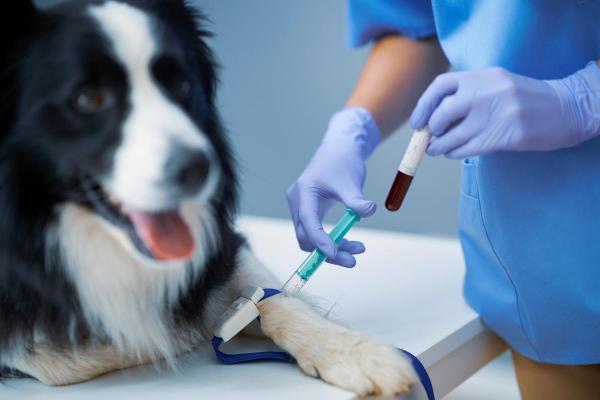Lymphopenia in Dogs - Symptoms, Causes and Treatments



See files for Dogs
In lymphocytopenia, the number of lymphocytes (a type of white blood cell) in the blood is abnormally low. Lymphocytes are a type of white blood cell that perform various tasks in the immune system, including protection against bacteria, viruses, fungi, and parasites. There are many conditions that reduce their numbers, but viral infections and malnutrition are the most common. Affected dogs may have no symptoms, or in some cases may have fever and other symptoms of infection.
The following AnimalWised article explains what lymphocytopenia in dogs is, its signs, diagnosis, and treatment.
What is lymphopenia in dogs?
Lymphocytes are a type of white blood cell. They play an important role in your dog's immune system, helping his body fight off disease and infection. Your dog's immune system is made up of a complicated network of immune cells, lymph nodes, lymphoid tissue and lymphoid organs. Lymphocytes are one type of immune cell. There are two main types of lymphocytes:
- T lymphocytes (T cells): T cells control the response of your dog's immune system and directly attack and kill infected cells and tumor cells.
- B lymphocytes (B cells): B cells make antibodies. Antibodies are proteins that target viruses, bacteria and other foreign invaders.
Lymphopenia is defined as a decrease in the number of lymphocytes in the blood and is a critical warning sign. This condition may also be accompanied by pancytopenia, which is a decrease in the total number of cells in the blood.
There are two types of lymphopenia that also affect dogs:
- T-lymphopenia: The number of T lymphocytes is reduced, but the number of other lymphocytes is normal.
- B-lymphopenia: When the number of B lymphocytes is reduced, but the number of other lymphocytes is normal. The cause in most cases is associated with taking medications that suppress the immune system.
Continue reading this article to learn more about how to understand a dog's blood test.
Causes of lymphopenia in dogs
There are several causes that may be behind a low lymphocyte count in dogs, but the most common are:
- Bacterial or fungal infection
- Postoperative after major surgery
- Malignant neoplasm
- Glucocorticoid therapy
- Stress
- Chemotherapy and/or radiation therapy
- Recent trauma or bleeding
- Viral infections
- Protein-calorie malnutrition
- Autoimmune diseases
When stress is persistent and incessant, it weakens the dog's immunity. Dogs often suffer from stress when they are abused or abandoned, or when they live with a dominant animal that is aggressive toward the gentler animals. Cancers and other serious illnesses also dangerously weaken dogs' immunity.
Your veterinarian will determine how the dog acquired lymphopenia and how to treat the underlying causes.
Continue reading this other article if you want to learn more about how stress affects a dog and how to tell if a dog is stressed.
Symptoms of lymphopenia in dogs
Lymphopenia in dogs itself has no specific symptoms, being associated with various causes. However, low immunity facilitates infection by various infectious agents, so the animal becomes susceptible and shows the symptoms of the infection in question, such as:
- Respiratory and digestive problems
- Malnutrition
- Loss of appetite
- Fever
In addition, low lymphocytes in dogs lead to a general deterioration of the animal, so it is normal that it appears tired, apathetic and lacking energy.
How to treat lymphopenia in dogs?
To treat lymphopenia in dogs, the cause must be found. That is, the underlying disease causing the blood cell disorder must be diagnosed, as there is no general treatment for all cases. For example, if cancer is the cause, chemotherapy could be the treatment. Infections are treated with antibiotics; parasites are treated with vermifuges. If stress is the cause, stress-reducing medications may be given. If the cause is identified and treated, lymphocyte counts should improve rapidly.
For this it is necessary that the dog is examined by a veterinarian, because only a professional can arrange tests, complete the diagnosis and determine the best treatment for the animal.
How to increase the dog's immunity?
In some situations, it is desirable to enhance the animal's immune response, for example, to increase resistance to infection and to treat immunosuppressive or infectious diseases of multifactorial origin. For this purpose, immunomodulators are used, i.e. substances that act on the immune system and enhance the organic response against certain microorganisms, including viruses, bacteria, and protozoa. The origin of immunomodulators is very diverse and may include pharmacological substances, microbial products and medicinal plants, so it is better to consult with the veterinarian.
In addition to immunomodulators, a balanced and quality diet is a very important factor in maintaining and increasing the immunity of the dog.
Nutritional management is also an important tool in the treatment of various diseases through the inclusion of nutraceuticals (dietary supplements that contain bioactive compounds beneficial to the body) in the diets of animals.
There are two approaches to immune modulation through diet: The first involves dietary components that act directly on pathogens and the microbiota in the gastrointestinal tract, and the second involves indirect effects on pathogens of the microbiota by targeting intestinal cells and/or immune cells.
As well as supporting the organic functions of sick animals, dietary supplements are recommended in the diet of dogs and cats to promote digestive health, immunity, skin and coat conditions, body composition, and prevention of age-related damage.
In dogs that are poorly fed and exposed to stressful situations such as cold and hunger, the body's defenses may weaken, and they become more susceptible to disease. Therefore, another way to increase lymphocytes in dogs is to make sure they live in a calm and stress-free environment.
If you want to learn more about proper nutrition for dogs, continue reading this other article, where we explain how to provide your dog with a balanced and natural diet.
This article is purely informative. AnimalWised does not have the authority to prescribe any veterinary treatment or create a diagnosis. We invite you to take your pet to the veterinarian if they are suffering from any condition or pain.
If you want to read similar articles to Lymphopenia in Dogs - Symptoms, Causes and Treatments, we recommend you visit our Other health problems category.
- Laurino, F. (2009). Hematological alterations in dogs and cats under stress . Faculty of Veterinary Medicine and Zootechnics, “Júlio Mesquita Filho” University, Botucatu Campus, SP. Available at https://repositorio.unesp.br/bitstream/handle/11449/119576/laurino_f_tcc_botfmvz.pdf?sequen. Accessed on 09/27/2022.
- Openwork, RT; Falcao, R.P. (2013). Heterogeneity of blood cells. Hematopoietic and lymphopoietic organs . Treatise on Hematology. Available at file:///C:/Users/carlamoreira/Downloads/C%C3%A9lulas%20do%20sangue.pdf. Accessed on 09/27/2022.
- Oliveira, L.P. (2015). Blood and Hematopoietic Tissue . LAAN. Available at https://files.cercomp.ufg.br/weby/up/707/o/sangue.pdf?1448365978#:~:text=Os%20gl%C3%B3bulos%20sangu%C3%ADneos%20s%C3 %A3o%20as,by%20blood%20through%C3%A9s%20dos%20leuc%C3%B3cytos. Accessed on 09/27/2022.
- Appolinario, CM; Megid, J. (2007). Use of immunomodulators in infectious diseases of domestic animals . Semina: Agricultural Sciences, Londrina, v.28, n. 3, p.437-448. Available at file:///C:/Users/carlamoreira/Downloads/jlgarcia,+Gerente+da+magazine,+2967-9798-1-CE.pdf. Accessed on 09/27/2022.





